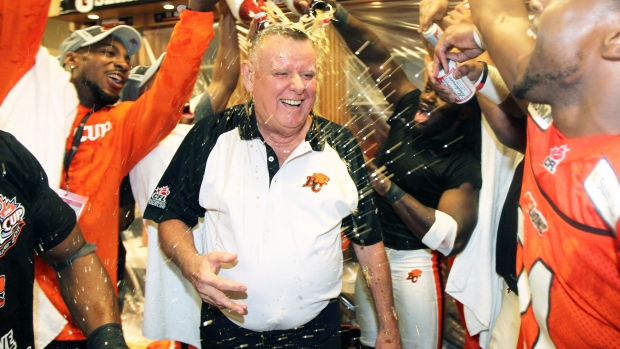Oct 26, 2020
Braley symbolized the past 30 years of the CFL
It became a common refrain among people within the league that there would be no Canadian Football League without David Braley, Dave Naylor writes.
By Dave Naylor

How to sum up David Braley’s meaning to the Canadian Football League?
Braley, the Ontario-based businessman and former Senator who passed away Monday at the age of 79, was at various times the owner of three teams in a nine-team league, including the Toronto Argonauts in whom he held a secret ownership position at the same time he owned the BC Lions.
He served as the CFL’s chairman of the board and took on the commissioner’s role in 2003 after he led the charge to oust Michael Lysko in 2002.
And until recently, when poor health interfered with his ability to participate in the business of the CFL, he was a powerful presence among league governors, so much so that every commissioner had to be aware of where Braley stood on key issues and be prepared to deal with being on the opposite side.
It became a common refrain among people within the league that there would be no Canadian Football League without Braley. And yet, he was both loved and loathed by those within it. Some considered him the league’s biggest benefactor, while others considered him a ruthless profiteer.
Braley grew up in Hamilton, Ont., rooting for the Tiger-Cats. He had played football in high school and at McMaster University, and was a Tiger-Cat season ticket holder before, during and after his ownership of the team, which went from 1989 until he sold the team in 1992 over his opposition to the CFL’s plan to expand to the U.S.
He re-entered the CFL officially as the savior of the Lions in late 1996, one of three CFL franchises insolvent by the end of that season. Braley claimed a federal cabinet minister had warned him that the CBC would bail as a TV partner if the league couldn’t field a Vancouver franchise the next season, so he stepped up.
When the Toronto Argonauts went bankrupt in 2003 under the ownership of Sherwood Schwartz, Braley was front and centre in the search for new owners, trying to broker a deal with Toronto businessmen David Cynamon and Howard Sokolowski.
The pair balked at the losses they’d be inheriting with the Argonauts. So Braley offered to be their partner, an arrangement that was known only by then-commissioner Tom Wright and select others before it was revealed in a 2009 Globe and Mail story.
The league subsequently passed bylaws requiring internal disclosure of all financial arrangements between teams. Braley eventually took over full ownership of the Argos in 2010, then sold the team to Bell and Larry Tanenbaum in 2016.
In its darkest hours, the CFL could always count on Braley, or so it seemed. He was there when the Lions and Argos needed new ownership, but also at various times over the past three decades when teams found themselves short on cash.
It’s believed he loaned money to every team in the CFL at least once, except for the Edmonton Eskimos. That includes to the Tiger-Cats during the years after he sold them to a non-profit group when he would continue to quietly write cheques to help the team make payroll. Braley’s name may not have been on the franchise, but he remained its primary financial backer.
That kind of financial influence in such a small league granted him enormous power, and Braley was never shy about trying to wield his influence over the direction of the league.
He also appeared to be rewarded with a disproportionate number of occasions to host the Grey Cup, which, in most circumstances, is a surefire money-maker. The Braley-owned Lions or Argos hosted the game five times over a 10-year period from 2005 to 2014.
Braley had created his wealth from scratch, taking a loan to purchase an industrial distributing company from a former neighbour, then shifting its focus into becoming a global auto parts manufacturing giant.
He was a well-known for his frugality as his wealth, a pattern demonstrated when he purchased the Tiger-Cats from an ailing Harold Ballard for $500,000, financed with proceeds from the team's five-year sponsorship agreement with Player’s Tobacco.
That frugality was legendary in the CFL. Despite his wealth, Braley was known to be reluctant to spend on what he considered unnecessary frills for his teams and the league.
His views on the business of the CFL were rooted in traditional approaches to marketing and selling tickets, and he privately railed against the league putting every game on television, favouring blackouts because he believed it would mean better business at the turnstiles.
He had waxed about selling the Lions for at least a decade, engaging with different groups of potential owners but always deciding either the timing or the group itself and what it was willing to pay for the team wasn’t right.
That seemed to do the franchise no favours as he continued to hang on as both his own health and that of his franchise was slipping.
Though the belief in Vancouver is that any Lions business turnaround has to start with new ownership, Braley’s ownership has been viewed as a safety net for the franchise during the pandemic, given his willingness to financially stabilize the franchise.
He was believed to be among the owners who were willing to play a shortened 2020 season, even without government support.
Braley in so many ways symbolized the past 30 years of the CFL: rooted in tradition, dependent on philanthropy and run by a powerful few.
There will never be another like him.

